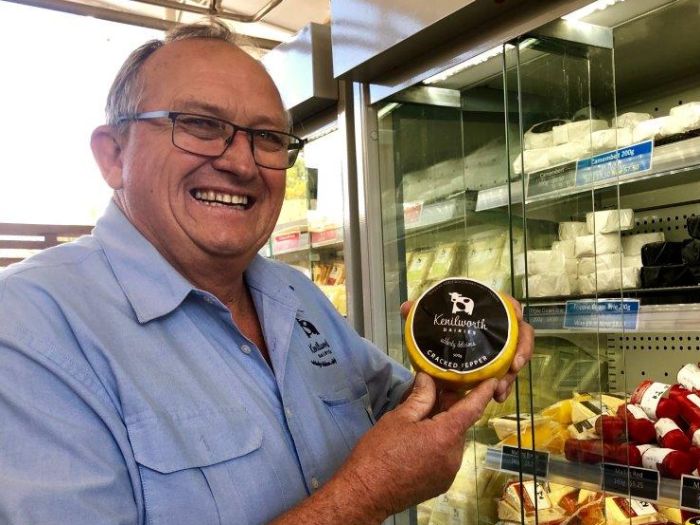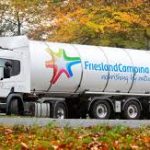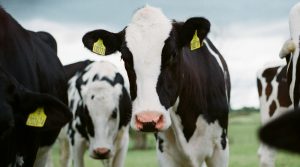
After decades of lobbying processors, supermarkets and government on behalf of his fellow farmers, John Cochrane took the ‘if you can’t beat them join them’ approach and bought a run-down cheese factory in Kenilworth two years ago.
In that time he has expanded Kenilworth Dairies’ range to 26 soft, blue, waxed and specialty cheeses — with a focus on using local ingredients like ginger and macadamia — as well as mousses, yoghurts, and ice-cream.
The products are sold to national and independent supermarkets.
But it is his success in drawing tourists from across Australia, who hover over his cheese tasting trays and beside filled rows of fridges and the factory’s cafe, which is proving to be a winner.
“I’ve got the mortgage on the place, I’m the dairy farmer,” Mr Cochrane said, as he introduced himself to his visitors.
“I came out here [the dairy’s retail section] three times yesterday.
“The first people came from Warrnambool, the second ones came from Christchurch, and the others were from Melbourne.”
Debra Johnston from Bairnsdale in Victoria drove nearly two hours from the Queensland capital with her Brisbane-based daughter.
“Word of mouth [brought us],” Ms Johnston laughed.
“My son was up here last week … so we’ve come back to get more supplies.”
Survival strategy
Since deregulation in July 2000, the number of dairy farmers in Queensland has plummeted from more than 1,500 to just over 320.
“I spent 31 years representing farmers at Parmalat [now Lactalis, a milk processing company] and nine years at the Queensland Dairy Farmers organisation,” Mr Cochrane said.
“The dollar-a-litre milk really, really concerned me.
“The future of the industry was really looking in trouble and the cheese factory was needing milk, so I set up a farm to supply them with milk, provided I had the first option to buy the factory.
“I finally got that option at a time when so many people were leaving the industry and I could see that we would be heading down the same track.”
The Cochrane family has been dairy farming in the Mary Valley, north-west of the Sunshine Coast, for six generations, running a mix of Friesian, Holstein, brown Swiss and Jersey cows on three farms.
Buying Kenilworth Dairies secured their future on the land.
“We had a distributor here yesterday that said he’s got 60 suppliers. They all flat-lined last year — bar us,” Mr Cochrane said.
“Our graph was not only going up, it was going up very, very steeply, which was really good.
“In fact, they’ve almost doubled their business with Kenilworth Dairies so we’re really happy about that.
“We’ve got a very good team working for us and we have put on a full-time marketer and a full-time salesperson. So they’re doing a very good job.”
From Kraft history to expansion
The Kraft Corporation first built the cheese factory back in 1950 and closed it in the 1980s when it centralised production and axed dozens of jobs.
In 1990, six past employees and a local entrepreneur founded Kenilworth Country Foods.
The Cochranes, who also own a real estate business and restaurant, purchased the business in June 2017.
The factory is a key driver of food tourism in the Sunshine Coast hinterland, including the Kenilworth Cheese, Wine and Food Festival which draws in thousands of visitors every year.
John Cochrane has invested in improvements to update the electrical system, built new cold rooms, insulated the production room, bought new machinery for the production line and investigated further export opportunities.
“We’ve probably grown 72 or 73 per cent since we’ve been here, which is pretty good,” he said.
“We’ve been able to mechanise and maintain our staff and we haven’t put anybody off. We’ve kept their jobs and got things more efficient.”
In fact the growth has meant an increase in staff — the business now has 46 employees.
Expansion plans also include installing a milk pasteurisation and bottling plant and the Queensland Government has offered to match Kenilworth Dairies dollar-for-dollar with a rural economic grant of up to $250,000.
To secure the grant, Mr Cochrane said he needed to borrow money, guarantee 26 jobs and recruit extra dairy farms.
He has offered to pay suppliers 70 cents a litre, year round, but admitted it would take patience to recruit local farmers who were under contract to other processors.
“I think we really can do it, we are just rearranging now and putting some walls up and air-conditioning the area to put the milk in,” he said.
Enthusiasm ripples down to all-ages staff
Forklift driver Stuart Harvey could not imagine working anywhere else.
“I’ve been here about for about 14 years and it’s gone from pretty average to pretty good now that John Cochrane’s taken over,” he said.
“My wife works here in dispatch and the orders have just doubled, tripled. It’s fantastic.”
Mr Cochrane laughed as he recalled the conversation he had with Scott Parker when the 58-year-old approached him for work.
“This guy rang me for a job one day and I asked him ‘have you got grey hair or no hair?’
“And he said ‘what’s that got to do with it?’ And I said ‘well if you’ve got grey hair or no hair you’ll probably turn up on time and do your best’.”
To this day, Mr Parker remains enthusiastic about his job.
“It’s very good to have industry like this that’s starting to expand. There’s plenty of work here and it certainly beats unemployment,” he said.
For now, as expansion plans ramp up and the hectic times are unlikely to subside anytime soon, Mr Cochrane’s passion is evident in his attitude.
“I’m 65 in December, not far away, and I still want to jump out of bed and run out here and get into it,” he said.
“So it is exciting.”
























